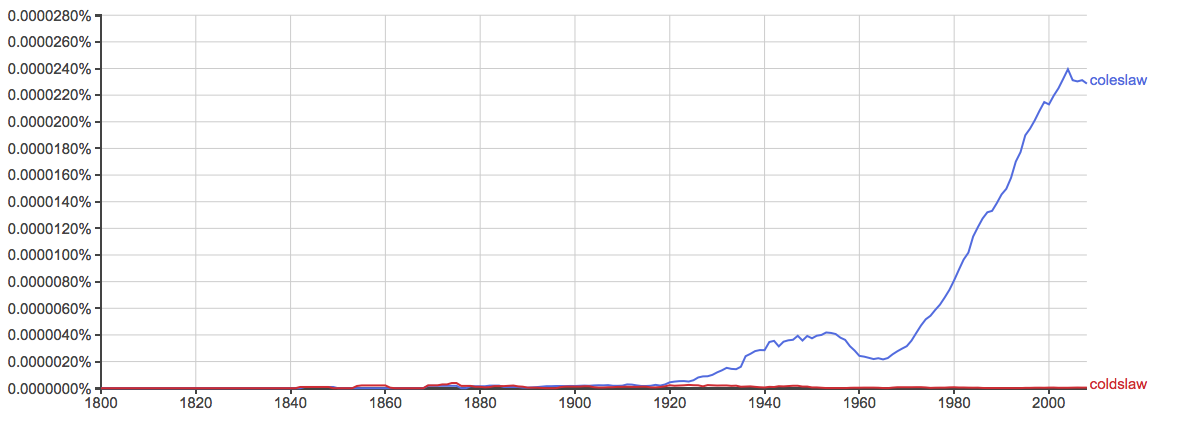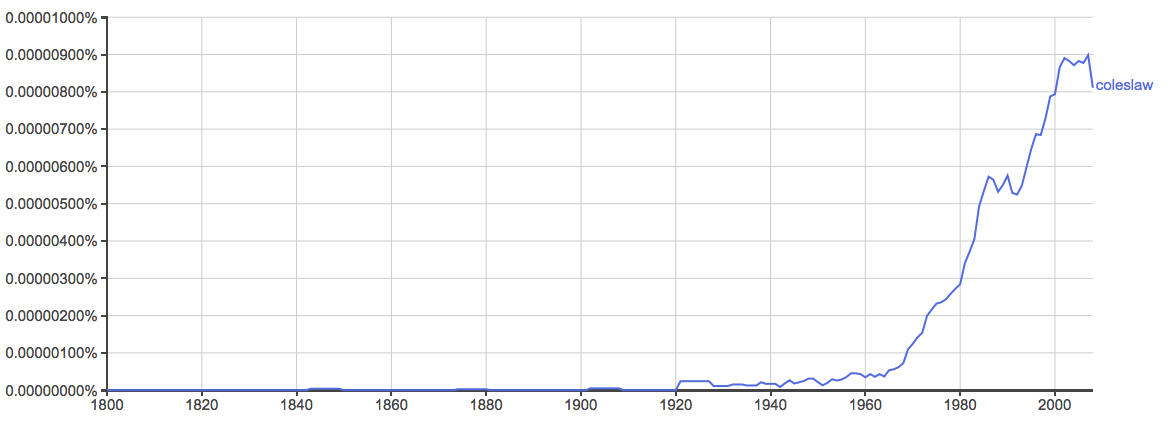Raw cabbage salad is a popular side dish in many countries, including the United States. In the U.S., it is a staple of pot lucks and summer cookouts and can even be found as a menu item at some fast food chains.
The recipe originates from Old World Dutch foodways, with the earliest appearance in cookbooks dating back to the 18th century. Some writers spell the name of this delectable salad coldslaw, while others spell it coleslaw.
Next time you need to bring a dish to your family’s cookout, you will want to be sure you know which variant is correct. Is it coleslaw or coldslaw?
What is the Difference Between Coleslaw and Coldslaw?
In this article, I will compare coleslaw vs. coldslaw. I will outline the proper spelling of this classic dish as well as its etymology.
Then, I will give you a useful memory tool that will help you decide whether to choose coldslaw or coleslaw next time you text your mother to let her know what you’re bringing to her summer party.
When to Use Coleslaw
 What does coleslaw mean? Coleslaw is a noun and the proper spelling of the popular cabbage dish.
What does coleslaw mean? Coleslaw is a noun and the proper spelling of the popular cabbage dish.
As mentioned above, it refers to salad made of finely shredded cabbage. While variations of this dish feature a wide array of other ingredients, most recipes call for vinaigrette of some sort, as well.
Here are some example sentences,
- “Uncle Bertrand’s coleslaw is the best I’ve ever tasted,” said Maddie.
- In the American Midwest, most coleslaw is made with cabbage, mayonnaise, carrots, and celery, as well as other ingredients.
- “It’s not a real potluck unless at least four people bring baked beans and seven people bring coleslaw!” said the pastor’s wife.
- What do people really want at a barbecue? They want food that goes well with beer in a can or a glass of rosé…maybe even rosé in a plastic cup. They want potato salad, coleslaw and cornbread. –The Wall Street Journal
The reason some people misspell coleslaw as coldslaw is because of the mistaken notion that the term refers to the temperature at which the dish is served.
The true etymology, however, is that coleslaw comes from the Dutch koolsla [kool = cabbage + sla = salad].
When to Use Coldslaw
 What does coldslaw mean? Coldslaw is a misspelling of the word coleslaw. It’s an error that isn’t entirely uncommon, especially in spoken dialectical English.
What does coldslaw mean? Coldslaw is a misspelling of the word coleslaw. It’s an error that isn’t entirely uncommon, especially in spoken dialectical English.
Given that it is considered a spelling error, it is considered substandard English and should be avoided.
The following chart shows the relative frequencies of coleslaw vs. coldslaw in American English books,

Intriguingly, the Google Ngram Viewer is unaware of any British author ever having used coldslaw in a published work,

Fascinating as they may be, the above graphs are not scientific, or precise. They only reach back to 1800, for example, and leave out spoken English entirely. Still, they provide a useful snapshot of a long-term trend and corroborate other sources.
In his book Garner’s Modern American Usage, Bryan Garner states that coleslaw appears 438 times for every use of coldslaw. In other words, virtually no one uses coldslaw.
Trick to Remember the Difference
In any bit of writing, you should choose coleslaw when writing about shredded raw cabbage salad. Doing otherwise would be an embarrassing mistake, potentially damaging your credibility as a writer—and especially as a food critic.
Coldslaw is inferior in written English. You can remember that coleslaw is the standard term since neither coleslaw nor the original Dutch koolsla contain the letter D.
Summary
Is is coleslaw or coldslaw? Coleslaw and coldslaw are two different spellings of the same noun, one being universally accepted and one being universally rejected.
- Coleslaw is the correct spelling.
- Coldslaw is a spelling error.
You can remember to choose coleslaw in most situations since it lacks a D, just like the original Dutch koolsla.
To summarize, coleslaw is the correct spelling, and coldslaw is a misspelling.
Contents
